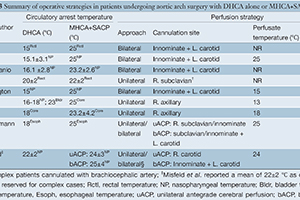A meta-analysis of deep hypothermic circulatory arrest versus moderate hypothermic circulatory arrest with selective antegrade cerebral perfusion
Abstract
Introduction: A recent concern of deep hypothermic circulatory arrest (DHCA) in aortic arch surgery has been its potential association with increased risk of coagulopathy, elevated inflammatory response and endorgan dysfunction. Recently, moderate hypothermic circulatory arrest (MHCA) with selective antegrade circulatory arrest (SACP) seeks to negate potential hypothermia-related morbidities, while maintaining adequate neuroprotection. The present meta-analysis aims to compare postoperative outcomes in arch surgery using DHCA or MHCA+SACP as neuroprotective strategies.
Methods: Electronic searches were performed using six databases from their inception to January 2013. Two reviewers independently identified all relevant studies comparing DHCA with MHCA+SACP, as defined by a recent hypothermia temperature consensus. Data were extracted and meta-analyzed according to predefined clinical endpoints.
Results: Nine comparative studies were identified for inclusion in the present meta-analysis. Stroke rates were significantly lower in patients undergoing MHCA+SACP (P=0.0007, I2=0%), while comparable results were observed with temporary neurological deficit, mortality, renal failure or bleeding. Infrequent and inconsistent reporting of systemic outcomes precluded analysis of other systemic outcomes.
Conclusions: The present meta-analysis indicated the superiority of MHCA+SACP in terms of stroke risk.
Cover






